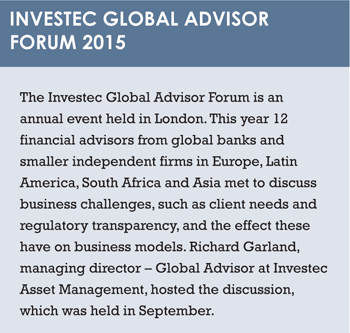Baby-boomers hold the most wealth – but advisors know they must act to connect with the next generation of millennials. Funds Europe, in association with Investec Asset Management, reports on the Investec Global Advisor Forum held in London recently.
Rock stars will inevitably find a generation gap appears in their audience at some point. Financial advisors never had to worry about this – until now.
As the millennial generation reaches financial independence, two trends are joining to bludgeon the advisor industry.
For a start, the millennials are likely to have lower trust in financial institutions after the financial crisis than their parents ever did. The other trend is ‘digital’, or specifically social media.
A group of 12 financial planners from around the world aired these views recently when they met at the Investec Global Advisor Forum in London.
SOCIAL MEDIA MYSTERY
All the advisors agreed that the digital question is difficult. The mystery of how to master it will not be solved soon. Yet in light of the millennial generation’s perceived mistrust of financial institutions, social media could also have a great strength if it is used correctly to help institutions overcome the lack of confidence in them.
“How people interact with a brand is not based on pedigree any more, but on social experience,” an advisor said.
To put it in Twitter terms, the move to digital is a huge ‘trending’ topic in the distribution sector, both for advisors and fund managers. However, digital implies not just communications and transactions, but extends even to digital financial advice, or ‘robo-advice’. This is a challenge for traditional advisors on multiple levels.
Depending on how the regulatory environment evolves around digital financial advice, advisors may be responsible for making sure the advice is robust and compliant.
Also, there is more competition. Digital advice is already contributing to the success of robo-advisors, firms that provide low-cost investment services, mainly to the mass market.
To compete with them, one bank advisor from Latin America who was at the discussion (which was held under Chatham House rules, meaning Funds Europe agrees not to identify participants) said the bank was looking at developing mobile apps for its millennial clientele. In itself, this is not surprising. Apps are ubiquitous. But the implications are important.
“We are moving to e-trading. Kids do not want to call their advisors, they just want to trade, and that’s the problem.”
If all they want is a tool, would they necessarily see a bank as a cutting-edge provider? Advisors do not want to lose out to ‘FinTech’ firms making better use of this disruptive technology. At one extreme, ‘relationship banking’ – a process historically employed to some degree across the whole advice spectrum – is replaced by the mobile phone, tablet or website.
Robo-advice may prove popular in the mass market, but what about millennials in the high-net-worth sector? A participant from Asia said his institution ran special days for the offspring of existing high-net-worth clients, in order to “get them engaged”. Yet even here, the technology angle is important for lasting relationships. The advisor highlighted WhatsApp and Viber, which are both instant messaging services, as important to this.
An advisor from South Africa highlighted that the industry’s experience of millennials is not going to be homogenous. His experience is that younger people do want proper advice and that they, in many cases, ask more questions than older savers.
In the move towards digital, there is still time to play with. Millennials are relatively less well off than the vast majority of clients in the baby-boomer generation. The majority of wealth still resides with older people who, as a market segment, are less tech-savvy.
One member of the Investec panel highlighted this with the example of a large pension scheme in Europe. A broad digital strategy was implemented that offered scheme members advice, guidance and execution. Though members engaged enthusiastically with the project, they only did so right up until the point of execution. At that point, many went offline and required a real – and reassuring – conversation before committing money.
BUSINESS MODELS
Yet even to give traditional advice is today hampered. Advisors widely shared the experience of regulatory trends that are making compliance a fraught task. Regulators have become extremely stuck on wanting information about customers and expecting financial firms to corroborate their clients’ activities. A global provider’s home-country regulator may even require this for clients in a country where there is no local requirement to provide it. In a sign of how regulation is impacting business models, the difficulties caused by this overspill of local regulation into global business models is behind the retreat of some US providers from Latin America, the panel heard.
This is seen also in the focus on fee transparency, an issue closely related to the ending of fund manager rebates and potentially lower profitability as a result.
 Put most succinctly, fee transparency is forcing advisers to either target higher net-worth clients who will pay fees for tailored services, or instead bring lower cost, simpler solutions to the mass market. One adviser from a smaller, independent business, explained how his firm had brought the advice fee down and now charges a 50 basis points (bps) wrap fee. Yet another advisor said the advice fee at his large global bank had actually increased.
Put most succinctly, fee transparency is forcing advisers to either target higher net-worth clients who will pay fees for tailored services, or instead bring lower cost, simpler solutions to the mass market. One adviser from a smaller, independent business, explained how his firm had brought the advice fee down and now charges a 50 basis points (bps) wrap fee. Yet another advisor said the advice fee at his large global bank had actually increased.
The disparate moves seen here seem to corroborate the belief that the global trend towards fee transparency will force advice firms to clarify who their strategically important customers are and to design a service around them with an appropriate charge.
It was suggested that to introduce higher fees would not become a trend. Fund management fees were predicted to move from 1.5%, to 50 bps, and the advice fee from 1% to 50 bps.
NO MORE GOLF
The only certainty at present in the advisor industry is that financial advice is experiencing a generation gap. Digital tools will be vital to retain relationships and content will be king as advisors seek to engage minds.
After all, as a participant noted, millennials will hardly want to play golf with their private bankers.
©2015 funds europe





